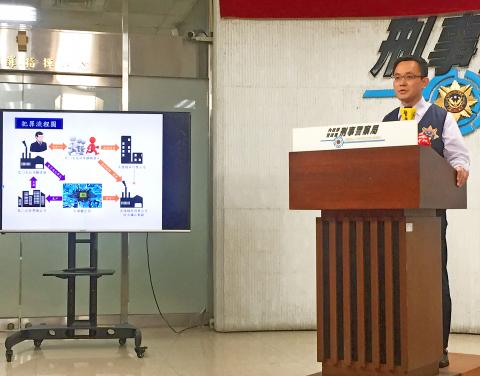Police arrested six current and former employees of German chemical maker BASF SE for allegedly leaking the company’s technology to a Chinese rival, the Criminal Investigation Bureau said yesterday.
The technology, used to produce high-purity ammonia for semiconductor applications, is estimated to have a market value of NT$3.52 billion (US$114.2 million), the bureau said, adding that the Chinese company allegedly agreed to pay approximately NT$200 million for the information.
The bureau early last year received a report that senior employees at a Taiwanese subsidiary of BASF are allegedly involved in intellectual property theft, Seventh Investigation Unit captain Lu Sung-hao (呂松浩) told a news conference in Taipei.

Photo: CNA
Bureau investigators found that a Chinese chemicals company was planning a factory in Jiangsu Province’s Zhenjiang City, police said.
To compete with BASF, the Chinese company hired a former BASF employee, surnamed Lin (林), who oversaw a factory in Taoyuan’s Guanyin District (觀音), paying him more than NT$410,000 per month since 2017, police said.
Lin recruited several engineers, who resigned from BASF at different times to join the Chinese firm, and a senior manager surnamed Huang (黃), who remained at BASF to continue providing information, police said.
Huang is said to be the head of BASF’s global electronic materials and engineering department, and oversaw the engineering departments at the subsidiary, police said.
Key evidence of the leak was found in October and November, with overseas bank accounts of the six showing that they had received a combined NT$40 million from the Chinese company, police said.
Police arrested Huang and five engineers who returned to Taiwan on Dec. 31 for alleged breaches of the Trade Secrets Act (營業秘密法), they said.
BASF’s key technology has already been leaked to the Chinese company, police said.
BASF said in a statement that it was aware of the investigation and the employees involved had been suspended from work.
“We have taken immediate steps to support the investigation led by local law enforcement officials and protected our information,” it said.
“BASF is committed to investing in and protecting intellectual property resulting from research and development, as well as production of know-how both by BASF and our customers. To this end we have established systems and policies which minimize risks,” it said.
“In light of this situation, we will further reinforce these information protection systems,” it said.

Seventy percent of middle and elementary schools now conduct English classes entirely in English, the Ministry of Education said, as it encourages schools nationwide to adopt this practice Minister of Education (MOE) Cheng Ying-yao (鄭英耀) is scheduled to present a report on the government’s bilingual education policy to the Legislative Yuan’s Education and Culture Committee today. The report would outline strategies aimed at expanding access to education, reducing regional disparities and improving talent cultivation. Implementation of bilingual education policies has varied across local governments, occasionally drawing public criticism. For example, some schools have required teachers of non-English subjects to pass English proficiency

‘FORM OF PROTEST’: The German Institute Taipei said it was ‘shocked’ to see Nazi symbolism used in connection with political aims as it condemned the incident Sung Chien-liang (宋建樑), who led efforts to recall Democratic Progressive Party (DPP) Legislator Lee Kun-cheng (李坤城), was released on bail of NT$80,000 yesterday amid an outcry over a Nazi armband he wore to questioning the night before. Sung arrived at the New Taipei City District Prosecutors’ Office for questioning in a recall petition forgery case on Tuesday night wearing a red armband bearing a swastika, carrying a copy of Adolf Hitler’s Mein Kampf and giving a Nazi salute. Sung left the building at 1:15am without the armband and apparently covering the book with a coat. This is a serious international scandal and Chinese

TRADE: The premier pledged safeguards on ‘Made in Taiwan’ labeling, anti-dumping measures and stricter export controls to strengthen its position in trade talks Products labeled “made in Taiwan” must be genuinely made in Taiwan, Premier Cho Jung-tai (卓榮泰) said yesterday, vowing to enforce strict safeguards against “origin laundering” and initiate anti-dumping investigations to prevent China dumping its products in Taiwan. Cho made the remarks in a discussion session with representatives from industries in Kaohsiung. In response to the US government’s recent announcement of “reciprocal” tariffs on its trading partners, President William Lai (賴清德) and Cho last week began a series of consultations with industry leaders nationwide to gather feedback and address concerns. Taiwanese and US officials held a videoconference on Friday evening to discuss the

PERSONAL DATA: The implicated KMT members allegedly compiled their petitions by copying names from party lists without the consent of the people concerned Judicial authorities searched six locations yesterday and questioned six people, including one elderly Chinese Nationalist Party (KMT) member and five KMT Youth League associates, about alleged signature forgery and fraud relating to their recall efforts against two Democratic Progressive Party (DPP) legislators. After launching a probe into alleged signature forgery and related fraud in the KMT’s recall effort, prosecutors received a number of complaints, including about one petition that had 1,748 signatures of voters whose family members said they had already passed away, and also voters who said they did not approve the use of their name, Taipei Deputy Chief Prosecutor